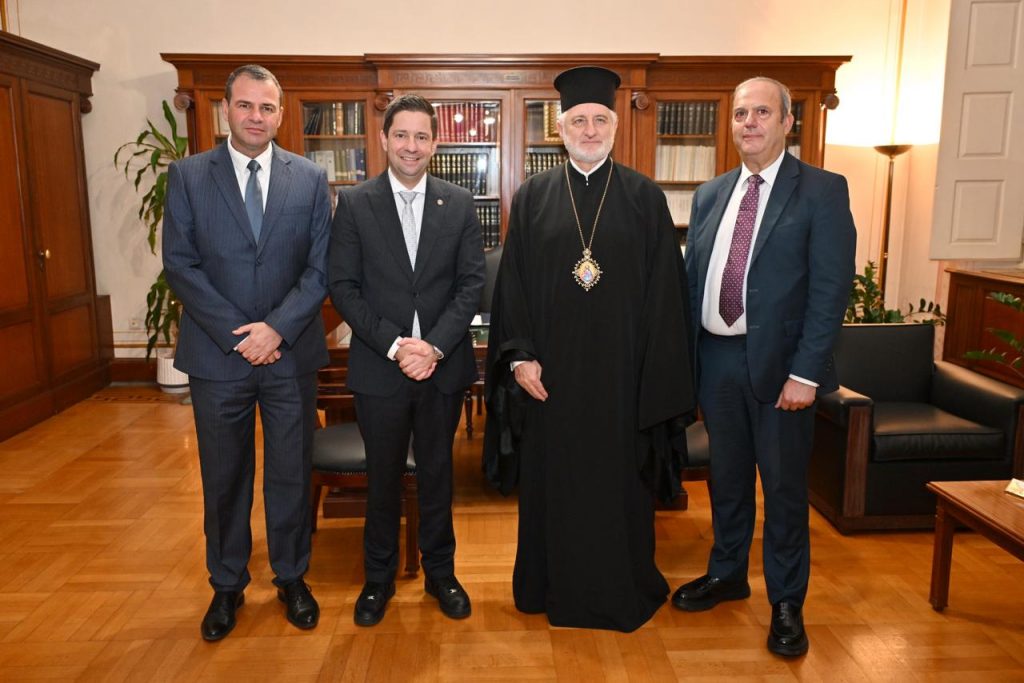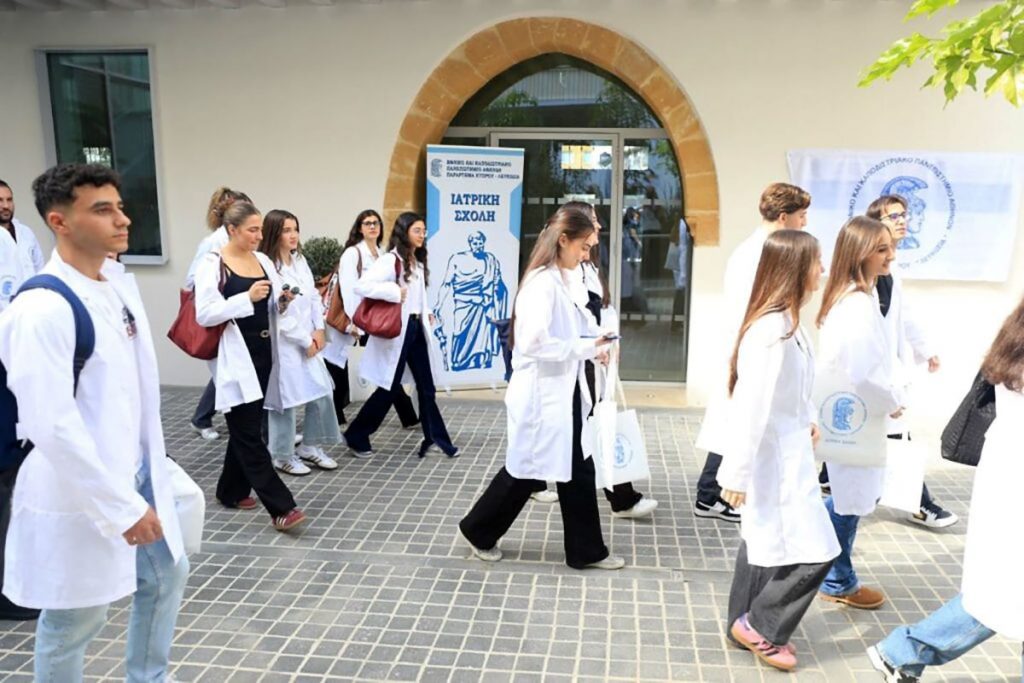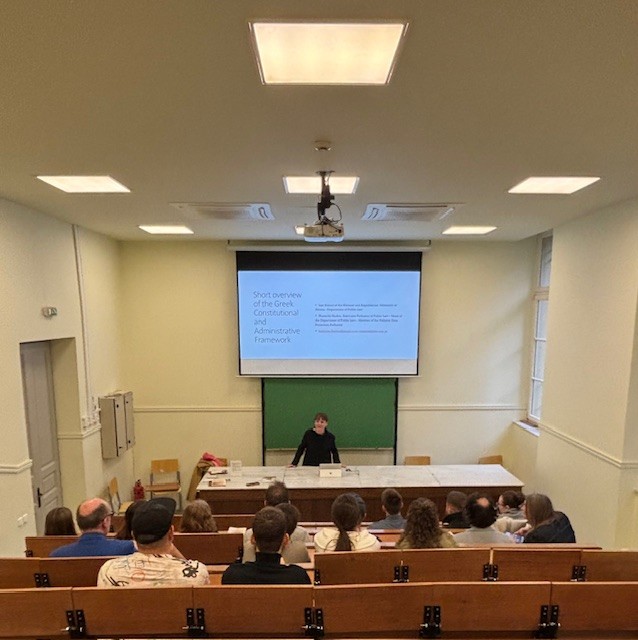Recent seismic activity in Santorini has been the topic of intense scientific research, attracting the attention of both the academic community and the general public. Many laboratories and research teams at the National and Kapodistrian University of Athens have been focusing on the phenomenon, thus contributing to its understanding and prediction. In addition, the NKUA’s School of Health Sciences and the Department of Psychology at the NKUA’s School of Philosophy have helped to investigate and address any social and psychological implications associated with the above tectonic activity.
Depending on their areas of expertise, the research laboratories and scientific teams that are active or ready to act in response to the seismic events around the island are listed below.
Department of Geology and Geoenvironment
The Laboratory of Prevention and Management of Natural Hazards, and specifically the research team led by Professor Emeritus of Dynamic Tectonics and Natural Disaster Management at the NKUA’s Department of Geology and Geoenvironment, Dr Efthimis Lekkas, are working on Santorini to monitor fault lines and study their relationship to the island’s seismicity, assess landslides, and update the operational plans ‘Enceladus 2’ and ‘Talos 2’. Professor Lekkas’s team includes faculty members and PhD candidates from the Department of Geology and Geoenvironment. It is worth noting that Professor Lekkas is the President of the Hellenic Earthquake Planning and Protection Organization, the Permanent Scientific Committee of Seismic Hazard and Risk Assessment, and the Permanent Scientific Committee for the Monitoring of the Greek Volcanic Arc.
Under the direction of Professor George Kaviris and with coordination from Professor Nikos Voulgaris, the members of another Laboratory, namely the Laboratory of Seismology, have set up seismic stations that record real-time data in digital form. The Laboratory participates in the Hellenic Unified Seismological Network (HUSN), which facilitates data sharing among seismic stations throughout the country. The Laboratory of Seismology performs daily automatic and manual processing of seismic data, with real-time interpretation available on the Laboratory’s web page at http://dggsl.geol.uoa.gr/. At the same time, the Laboratory uses novel Artificial Intelligence and Machine Learning approaches to process the massive amount of accessible seismic data. The goal is to identify a much greater number of seismic events than with traditional techniques while providing reliable results. To map the fault structures that are activated during seismic sequences and understand their spatio-temporal dynamics, the specialized staff at the NKUA’s Laboratory of Seismology combines the above approaches with methods for reducing the spatial uncertainties of hypocentre locations and determining the mechanism that underlies the most significant earthquakes.
Under the direction of Professor John Alexopoulos and in collaboration with the members of the NKUA’s Laboratory of Seismology, the Laboratory of Geophysics has been involved in the installation of 2 new permanent GPS/GNSS total stations and the recalibration of the network of the 21 non-permanent GPS total stations. More specifically, to record ground displacements at the centre of the seismic activity of the last few days, Assistant Professor Vassileios Sakkas has:
-installed in the area of Cape Columbo one (1) new permanent GPS/GNSS total station,
-installed on the rocky islet Anydros one (1) new permanent GPS/GNSS total station (in collaboration with the Department of Geology of the University of Patras and the Institute of Geodynamics of the National Observatory of Athens), and
-recalibrated the non-permanent network of the 21 GPS total stations on Thera-Therasia-Kameni.
Regular updates on the activities of the NKUA’s Laboratory of Geophysics are provided on its web page at https://geophysicslab.geol.uoa.gr/.
Professor Filippos Vallianatos’s research team in collaboration with the Laboratory of Geophysics and the Laboratory of Seismology has been carrying out seismicity analyses around Santorini using statistical mechanics, geocomplexity, and machine learning methods to predict the phenomenon’s spatio-temporal behaviour and dynamics. The team has been studying the seismic phenomena using advanced machine learning and critical phenomena analysis methods to track the dynamics of fault structures activated as non-linear systems at a critical state. Professor Vallianatos’s team includes faculty members, postdoctoral researchers, and PhD candidates at the NKUA’s Department of Geology and Geoenvironment, along with geoscientists from Universities in Greece, Europe, and the United States, as well as from the UNESCO Chair on ‘Solid Earth Physics and Geohazards Risk Reduction’.
The Laboratory of Physical Geography, under the direction of Professor Serafeim Poulos, and the Geological Oceanography team, under the academic coordination of Professor Paraskevi Nomikou, have been working on submarine mapping and morphodynamics, the study of volcanism, geophysical surveys, and other geohazards, including landslides and slope stability. The team includes faculty members and PhD candidates at the Department of Geology and Geoenvironment, as well as geoscientists.
The members of the Laboratory of Remote Sensing, under the direction of Professor Manolis Vassilakis, will travel to the region to identify areas where landslides are likely to occur, using state-of-the-art close-range remote sensing technologies. Data will be acquired by UAVs fitted with high-resolution cameras and LiDAR sensors that will offer extremely accurate information on slope erosion. By mapping critical zones in a systematic and regular manner, it will be possible to identify areas at increased risk of rockfalls and landslides. The same spatial data will be used to simulate the route of the rocks in the event of a fall, thus providing guidelines on the best protective measures. In addition, satellite data from the Greek microsatellites (https://hsc.gov.gr/) will be employed to monitor over time the surface geomorphological changes on the islands of Thera and Therasia, as well as the surface temperature variations on the islands of Palaia and Nea Kameni.
The teams of Professors Niki Evelpidou and Efthimis Lekkas will prepare a study on landslide risk and coastal vulnerability in the event of a tsunami. This study will consider geomorphological factors that contribute to slowing down the speed of the tsunami wave as it approaches the shore. The team, which includes PhD candidates at the NKUA’s Department of Geology and Geoenvironment, has already mapped the submarine portions of the Cyclades shoreline and now keeps extensive records of positions that have suffered displacements in the recent geological past. As part of the project, the team will revisit places where measurements have previously been taken to determine any changes caused by recent tectonic activity.
The team of the Laboratory of Historical Geology and BioGeosciences, under the coordinating guidance of Professors Maria Triantafyllou and Assimina Antonarakou, will investigate ocean acidification in Santorini’s submarine volcanic field, which serves as a natural laboratory. The researchers will concentrate on recording and quantifying the effects of increased CO2 concentration and acidification on the marine pelagic environment, for which there is little information available, even at the global level. Preliminary results from the water column in the above area have indicated decreased calcification and malformation of calcifying phytoplankton, most likely due to elevated CO2 levels. The study aims to determine the critical biological thresholds and better understand how species and genera adapt to their natural environments in the face of rising acidification. The naturally acidified water column in Santorini’s submarine volcanic field provides a unique opportunity to test theories of ocean acidification in situ, calling for ongoing monitoring of its effects on the biological system so as to validate global models and predictions about the long-term consequences of ocean acidification.
The Laboratory of Economic Geology and Geochemistry has been conducting systematic research into the submarine volcanic activity around Santorini, focusing on the formation and geochemistry of the mineral-rich volcanic deposits on the seabed. Professor of Economic Geology Stephanos Kilias and his research team, in collaboration with Paraskevi Nomikou and her team, have been studying the composition of the deposits and the mechanism by which they were formed.
At the same time, Professor of Geochemistry Ariadne Argyraki and postdoctoral researcher Dr Andreas Gontikas coordinate the EU-funded nexus monARC project (nexusmonarc.eu, Horizon EU Grant no. 101079156). As part of this project, a citizen science network is being built to periodically acquire physicochemical data from marine areas of the Greek Volcanic Arc (Methana, Milos, Santorini, Nisyros). Particular emphasis is being placed on monitoring the environmental impact of the present geodynamic activity around Santorini. The data obtained will allow researchers to assess the dynamics of natural and human-induced pressures on the region’s marine ecosystem. In addition, participation by citizens will help them build skills, promote environmental awareness, and improve public understanding of geohazards in areas of volcanic activity. The study of the project’s time series datasets is expected to yield important information on the influence of the current geodynamic activity on the Santorini marine environment, thus contributing to science and the implementation of suitable management strategies.
The Section of Mineralogy and Petrology has been actively participating in the study of the Greek Volcanic Arc by closely monitoring the recent seismic events in Santorini’s volcanic field, as well as the magmatic activity both within the caldera and in the submarine volcano Kolumbo. The research team consists of Professors Panagiotis Pomonis and Athanasios Godelitsas, as well as Associate Professor Dimitrios Kostopoulos. Professors D. Kostopoulos and P. Pomonis have evaluated the volcanoes of the Greek Volcanic Arc in terms of petrogenesis as well as the physical and mechanical properties of magmatic rocks, developing thermodynamic and thermomechanical models to accurately interpret the lithosphere’s rheological behaviour, in conjunction with the activity of geothermal fluids. They have recently developed and continue to improve the first Greek algorithm for accurately predicting the Volcanic Explosivity Index (VEI), which is based on the chemical composition of lava and represents a global novelty. They have also developed an algorithm for volcanic hazard assessment. Professor A. Godelitsas participates in research expeditions to the submarine volcano Kolumbo, with the purpose of researching the mineral phases deposited in the crater by the action of hydrothermal fluids.
School of Health Sciences
The Dean of the NKUA’s School of Health Sciences, Professor Pagona Lagiou, the Chair of the Department of Medicine, Professor Nikos Arkadopoulos, and Professor of Surgery Emmanouil Pikoulis are all actively involved in the mobilization of the University of Athens’ resources for the management of any health emergencies that may arise on Santorini. The special task force for mass event management, led by Professor E. Pikoulis and focusing on setting up health units, is in full operational readiness. The team consists of nurses and doctors of various medical specialties, faculty members, as well as graduates and teaching staff from the Postgraduate Programme ‘MSc in Global Health – Disaster Medicine’. The team members have been trained for mass event management by the World Health Organization. They are well-known for their operational experience gained from comparable crises in Greece and elsewhere and for arranging educational programmes on natural disaster management in European, Asian, and African countries.
Laboratory of School Psychology: Training, Research, and Practice – Department of Psychology, NKUA
The Laboratory of School Psychology at the NKUA’s Department of Psychology (https://schoolpsychlab.psych.uoa.gr/) has developed an integrated, multi-level model of psychological services delivery, aiming at preventing and promoting mental resilience both in the school environment and at home. Strengthening the University’s collaboration with schools and local communities at the national and international levels, the Laboratory’s scientific team responds to contemporary challenges, such as the economic crisis, the COVID-19 pandemic, and natural disasters (earthquakes, wildfires, floods), by implementing action plans for the relief of schoolchildren, teachers, parents, and guardians. The Laboratory works in conjunction with the NKUA’s Postgraduate Programme in School Psychology to identify and assess needs, develop and implement interventions in the school setting, raise awareness and train teachers, specialists, parents, and guardians, as well as produce special educational material and handouts. Directing the Laboratory is Chryse (Sissy) Hatzichristou, Professor of School Psychology, former President of the International School Psychology Association, and member of many international and American psychology societies. Professor Hatzichristou focuses primarily on issues including adjustment and support for vulnerable groups of schoolchildren, promotion of mental health and mental resilience in the school community, counselling for teachers and parents/guardians, and crisis management in the school environment. She is also interested in teaching and training in School Psychology, as well as the development of international collaboration networks.

















